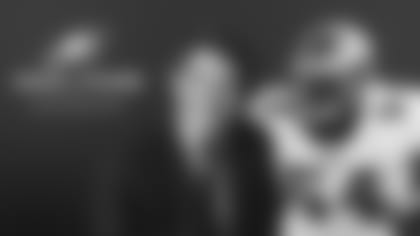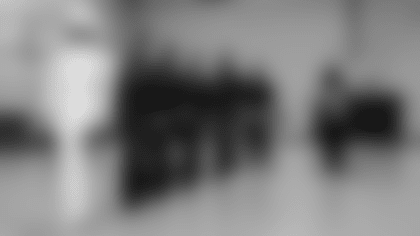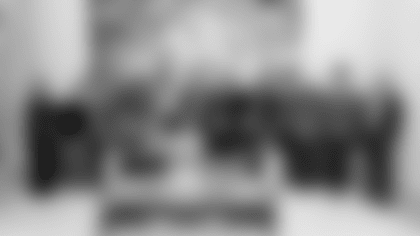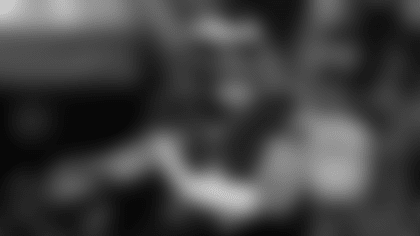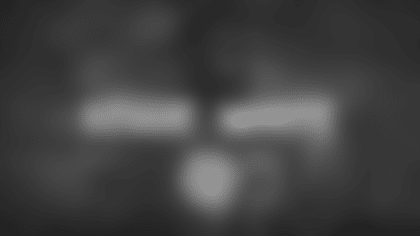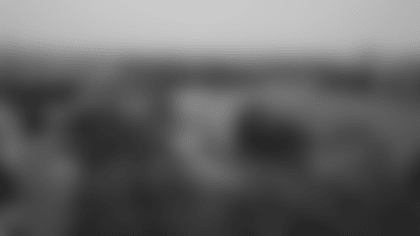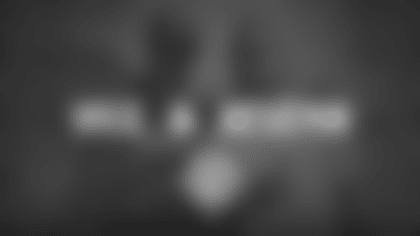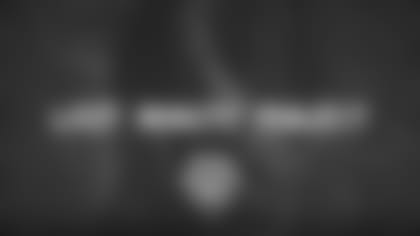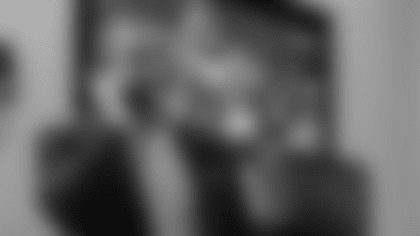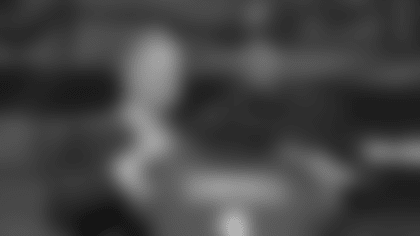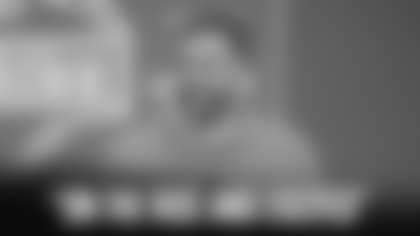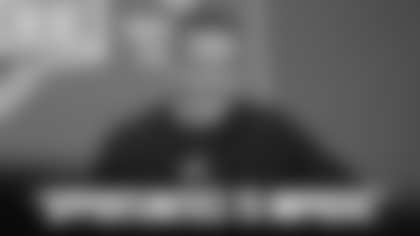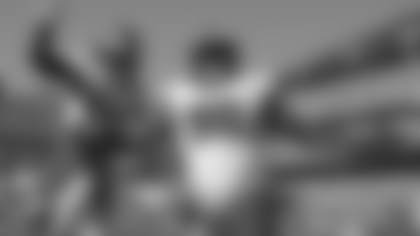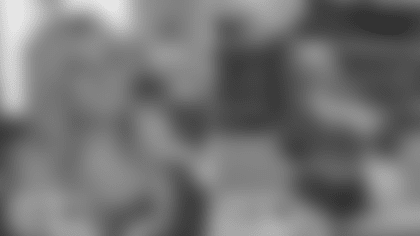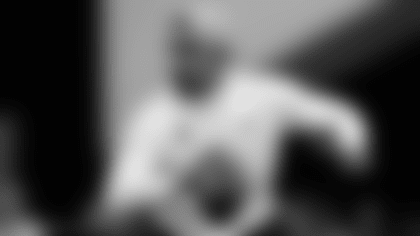During halftime of Monday night's game against the Green Bay Packers, the Eagles will welcome two more into the franchise's illustrious Hall of Fame. Jeremiah Trotter helped provide the heart and soul of the Eagles defenses of the early 2000s. He was the man in the middle of it, calling the plays and aligning the front seven under defense coordinator Jim Johnson. Meanwhile, Merrill Reese has been an institution in Philadelphia for the last 40 years, calling each game with the excitement and passion as if it were a must-win for the Eagles.
Trotter and Reese will enter the Eagles Hall of Fame in front of the Lincoln Financial Field crowd on Monday night, but earlier this week, the duo joined Chris McPherson and Alex Smith on the Eagles Insider Podcast to discuss their respective impressive careers and what it means to them to be honored by the team.
Here's a sample of that they said. You can also listen to the entire podcast, included above.
Jeremiah Trotter
Q. Describe where you were when you got the call you were going to be inducted into the teams HOF?
A. "I was in Florida with my boys. My youngest son Josiah had a basketball tournament down in Florida, we were down there for the whole week. I was in the hotel room and Jeffrey gave me a call and he broke the news to me. When he first called me it was kind of like, you're surprised but you're not surprised. You're excited and you don't really know what to think at the time. So I started the whole process, my wife and I are getting our list together and stuff like that. And it still really hadn't hit me. I think as we get closer, (Brian) Westbrook texted me yesterday "Yo man, it's almost here you getting excited?" So now it's really, really starting to hit me. It was a great feeling when Jeffrey (Lurie) gave me a call. It just shows that all of the hard work you put in paid off and people recognized that, that's a great feeling."
Q. Did you take time after your career ended to think about your legacy? To think about the mark that you left here on this organization?
A. "I did, I did. Because sometimes when you're playing and you're younger you really don't have an opportunity. You're so focused it's almost like you're programmed. Training Camp, you're staying in shape. All season you're staying shape. Training Camp you're out there working and trying to get in shape for the season. And the season is week to week. You go from one opponent to the next. It's laid out for you and you kind of go through that your whole career. You never really have the time or the opportunity to reflect on how rare it is just to make it to the NFL. Not to stay, just to get in the door. It's even tougher to stay especially a guy like myself who played 11 seasons. Coming in I had a messed up knee, which most teams failed me on my physical. I mean some teams took me from the first round to completely off the board. And then to have the Eagles take a chance on me and draft me in the third round is an amazing feeling. I really had the opportunity to just sit back like, man, coming out of Hooks, Texas, and the population of about 2,700 people and to make it to the NFL on a national stage it was a great feat and I feel very humbled, and blessed to be able to get to that point.
Q. How did you get the nickname the Axe Man?
A. Well I grew up chopping firewood with my dad. So those days, those long hot summers, 105-110 degrees in that summer Texas heat, you know molded me into the person you see now and the person you saw play on Sundays. So once I started to make a name for myself during my second year, I would see guys around the league doing a signature move. You see Brian Dawkins coming out of the tunnel crawling and he was a wolverine. I said, "Man, I want to do something." I didn't know what I wanted to do so I kind of prayed about it. I said, "You know what, man? I grew up chopping wood. I could do the axe." I mean, I definitely know how to do that. I tried it one game and it kind of stuck and we just rolled with it."
Q. How much of an impact did your father Myra have an impact on you?
A. "I can't talk about this guy enough. My dad, everything I know, I learned from him. Just learned how to be a man. I mean you're talking about a kid who worked beside his dad every day of his life. From the time that I could tote a stick of wood as small as you can think of until I left to go to college I worked beside my dad every day. He taught me everything, just about life, working hard, and that anything you want you work hard to get it. Nobody's going to give you anything and just always do your best. Learn how to respect others and demand respect from others also. He instilled a lot of things in me that I instill in my kids today. He's my biggest hero.
Q. Now that some time has passed, you walk around the building here at the NovaCare Complex and outside the auditorium there's four pictures of four great players in franchise history and you running out of the tunnel is one of them. What does that mean to you?
A. "It means a lot. I remember when it first went up, Dave Spadaro sent me a text message and showed me the photo. It means a lot. You walk through these corridors, these halls, and you see your Pro Bowl pictures up and you see that picture hanging up in there and all the young guys they meet every morning and they go right in there and they look at those photos as they go into the auditorium. It means a lot. Just being thankful that I'm a part of the Eagles history and a place where my heart is. I stayed here, my family's here, my friends are here and my church is here. I'm part of the community. I just can't say enough about how much I'm honored and appreciative for the Philadelphia Eagles, Jeffrey Lurie, and all of the people that played a major role in my success. Andy Reid, Jim Johnson, Steve Spagnuolo, those guys. And not to mention all of my countless teammates to help me get to where I am now because I couldn't make plays by myself. It was those guys out there sacrificing. It's going to be exciting see a lot of those guys come back because they're just as much a part of this honor as I am.
Merrill Reese
Q. Paint the picture of what it was like when you got the call from Jeffrey Lurie that you were going to be placed in the Eagles Hall of Fame?
A. "It was unbelievable. I was figuring what is Jeffrey calling me for and I thought maybe he wants to invite me to play some golf with some of his friends and that's really nice because I would be happy to play golf. But when he said that I was going into the Eagles Hall of Fame, I got emotional. I really did. Because I never thought about anything like that. All I think about is doing the game. I don't do the games for a reward or for an honor. Or for to go into Halls of Fame, to get stories written about me. I do them because I just love to broadcast Eagles football. From the time I was a kid, from the time I realized I wasn't going to quarterback the Eagles someday, I picked the next best thing and that was it. I wanted to be up in that broadcast booth. Here I am being honored for just having the best time that anybody could ever have. I don't want anybody to ever think this is the culmination or that I can retire because I want to do this for the next- ever. This is what I love to do.
Q. When you first decided you wanted be a broadcaster, who were some of your inspirations? Who were the guys that you listened to and said "I want to be like that guy"?
A. Well the local guy, and I still think he was the greatest broadcaster in Philadelphia history, was Bill Campbell. Bill Campbell was wonderful, when I was growing up, he did the Eagles, he did the Phillies and he did the Warriors who proceeded the 76ers. He did the 76ers, he did the Penn Relays, and he did nightly commentaries. He was a marvelous interviewer. I loved Bill Campbell. I used to go to Franklin Field and watch the Eagles. I'd have my binoculars and stare up at the broadcast booth between plays and look at Bill Campbell and go down to the field and watch what was going on. Bill Campbell was the guy and we became very good friends. My wife and I were actually two of the few of the non-family members who celebrated his 90th birthday with him. When Bill and his wife renewed their wedding vows after 50 years, we were there. He was a big part of our life. He and his wife, Jo, became almost like an aunt and uncle so that was a great thing. But Bill was the local guy. Nationally, there was a broadcaster who did Packer games and he did a lot of television, network television. And not many younger people have heard him but he was great. He did the first Super Bowl, and his name was Ray Scott. I don't know if any of you have ever heard of Ray Scott but he did play-by-play the way it was meant to be done on television. And when he did the Packers, he wouldn't waste words. He was so precise and concise and he was great. The radio guys paint the picture and to me nobody did it better than Bill Campbell.
Q. What I love about your story, your road to becoming the play-by-play voice of the Eagles, is that it wasn't a smooth ride. You went through a lot of rejection along the way. Can you tell people about that part of your story?
A. I went to Temple University where I majored in communications and quickly by my sophomore year I was the sports director of the student station. By the time I was graduating I thought I'm pretty much ready for the world. I'm big man on campus. I'm doing NIT games, NCAA regional games, I'm doing every Big 5 game. I'm doing five, six basketball games a week because we had a lot at the Palestra, we had everybody. One day I did five games. I did three high school playoff games in the afternoon and a Palestra double header that night. So I'm doing all of that, I'm doing basketball I'm doing football, I'm doing it all. But of course it was a little matter of a military draft at the time and I was fortunate enough to get into a Navy program and I was a Navy Public Affairs Officer, and I came out as Lieutenant Sr. grade. Again, that added a lot of confidence to you. I started sending out my things to networks and I didn't even get anything back. Then I went to the local stations and they would humor me by having the receptionist would give me a piece of paper to fill out and I never heard anything back. I still couldn't find anything until finally I heard about an opening at WCOJ in Coatesville, Pa. So I drove out there and I auditioned and the station owner, I will never forget it, his name was William Halpern, he came out after I auditioned and he said to me, "You can't start here, you have to start some place small." Now this was in Coatesville, Pa. This was two rooms looking over a car agency and I have to go start somewhere small. The funny thing is years and years and year later, probably 10 years later I was already doing the Eagles, I was at a banquet and this little old man came up to me and said "Merrill?" and I said "yes" he said "My name is Bill Halpern and I was wrong." I've been out of the service for over a year, and people are saying to my mother, "Helen, when's your kid ever going to get a job?" So finally I heard that a station in Pottstown was looking for somebody to do a high school football game, Pottsgrove Vs. Springford, on a Saturday afternoon. I went there and I spoke with the station owner his name was Herb Scott, and he said, "listen, I'll give you a chance but you look like you're about to have a nervous breakdown and I said, "you're probably right," and I went home. At this point all of my confidence was gone. So Friday afternoon, the phone rang and Herb Scott said to me, "Listen, I can find absolutely nobody else to do this game tomorrow. It's between you or dead air." So with that great endorsement I drove up there and I did the game and by the time the second half came on I was really feeling my oats and the next Monday morning he called me to come up and hired me full-time. I worked Sunday through Sunday, seven days a week and made the princely sum of $65. But I had a job and I was off and running."
Q. The best call of your career, the Miracle at the New Meadowlands.
A. It was my favorite moment, because there are many of them. From the original Miracle of the Meadowlands to Montgomery against the Dallas Cowboys on January 11, 1981. But it was the culmination of the greatest Eagles comeback I have ever seen. I mean they were down by a million points. And I think I said at the end of the first half the score is the Giants 24- the Eagles are still at their hotel. Suddenly they came back and it was Michael Vick to Brent Celek over the middle, leaped over a man to run 64 yards, recovered an onside kick, Akers kicked it Riley Cooper picked it up. Vick drove them down again, scored on a quarterback draw. Vick drove them down again, hit Jeremy Maclin inside the left pylon and it all came down to holding the Giants, which they did, and the Meadowlands was quiet. And then the Giants punter went back, and I will never, ever, ever forget Mike Quick said there's no way they punt to DeSean Jackson with seconds left. And he did. DeSean looked up and he muffed the punt which I think threw off their timing and the red sea parted and Jason Avant threw a leveling block halfway down and DeSean danced around at the 1-yard line. I'm screaming, I don't care if he dances just get into the endzone and he did. And to me that was 1) the greatest Eagles comeback I've ever seen. The most dramatic finish I've ever seen to a game. And I will tell you to this day we talk about the great quarterbacks. We talk about Peyton Manning, we talk about Tom Brady, we talk about so many great ones, Aaron Rodgers, all of these great guys. That was the single greatest half of football I have ever seen played by any quarterback. The way Michael Vick took that game into his own hands and put DeSean in the position to win it.
Q. Have you thought about what Monday night will be like for you?
A. I have, but my concentration has not been so much on what happens tonight at halftime, or before the game or any of this. My concentration tonight is I still have 46 numbers of Green Bay Packers that are bouncing around in my head. And I still have to go on the air and describe this game clearly and at all times make sure people know what the score is, the time of the down and the distance is. I still have to figure out how they're going to get me down on the field, which they promise they will, go on after Jeremiah Trotter, say my thank yous and get back to the booth without wasting a single second and say "It's teed up and we're off to the second half." My focus is more on the game than anything else. (The day after), I will let the whole thing sink in and really enjoy it.



